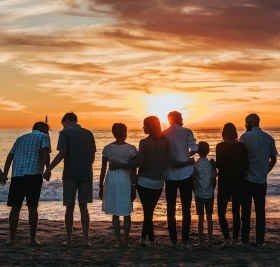The Intangible Significance
of Living
by Susan Scarlett
Page 2 of 3
Onion, my Mentor: What are you afraid of?
Me: Pain. Limitations. Dependency. Suffering. Unhappiness. This Parkinson’s diagnosis is not a death sentence, it’s a life sentence – a life sentence in prison. I feel shaky and emotional sometimes, and I don’t know what to do if this Parkinson’s gets really bad. Something buried deep inside scares me. I feel trapped. The only way I know how to escape this prison of pain and sadness is to do what my father and my grandmother did – just end it all.
Truth-Tellers: We hear you. Let’s talk about this. We hear you saying that suicide is an option. Is that how you feel now? Is that your truth?
Me: Now? Oh no, not at all. I’m not thinking about anything like that at all, not now. It’s a theory of what might happen if things go downhill and my condition worsens significantly. It’s been part of my family’s story since I was a teenager. We consider it to be an individual “right”, like the euthanasia we offer our pets if they are drastically ill or injured. Suicide is such a harsh word. It’s really euthanasia, isn’t it?
Onion: Is it?
Me: That’s what I’ve always thought. Now, though, after the heart-breaking ways my grandmother and my father died, I’m beginning to wonder if the word “euthanasia” is synonymous with the word “suicide” after all.
Reality: What are you feeling when you think about suicide?
Me: Conflict. Fear. I’m realizing that taking one’s own life isn’t just about an individual and their own pain. I see now that taking my own life, even if it was done with the knowledge and support of my closest friends and family, could have painful or sad consequences that I wouldn’t know about, consequences which could live forever in the ones I left behind. That’s the conflict. My fear is really about pain. I don’t want any more pain than I’m dealing with now, pain that came as a result of the cancer treatments and surgeries. I want to rise above pain and I’m not always successful. It seems like “checking out” should be my right and that after deep discussion with loved ones, the timing should be my decision, too – especially if I’m dealing with intractable pain.
The Family: (interrupting) We never wanted you to live in fear. We always wanted to protect you. We want to keep you close, encircled, just as we are now. Can you feel it? We want to take care of you, we want to make your life easy and happy. We want you to be safe.
Me: Safe from what?
The Family: From being hurt. From being in conflict. From being taken advantage of. From the unknown.
Truth-Tellers: And as it turns out, the behavior you modeled for her when she was a child taught her a whole lot more about conflict-avoidance than about problem-solving.
The Family: How dare you? You weren’t even there!
Me: So you’re saying you protected me from situations which hadn’t even happened?
The Family: Yes, of course. You were a quiet girl. So quiet. Sweet and almost helpless. We stepped in quickly to make sure you weren’t hurt and didn’t feel any pain.
